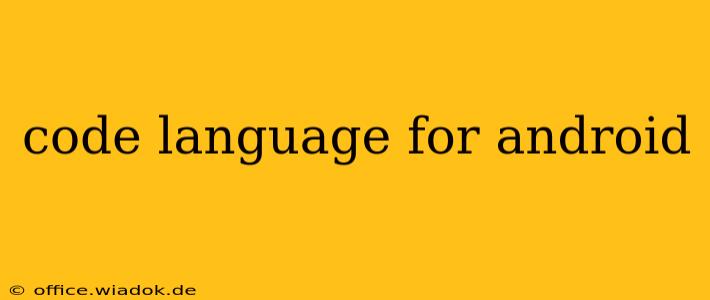Android app development thrives on a robust and versatile coding foundation. While multiple languages can interact with the Android framework, Kotlin and Java stand out as the dominant forces shaping the Android ecosystem. This article delves into the specifics of each, exploring their strengths, weaknesses, and the overall landscape of Android programming.
Kotlin: The Modern Marvel of Android Development
Introduced by Google as a preferred language for Android development in 2017, Kotlin rapidly gained traction. Its concise syntax, enhanced safety features, and seamless interoperability with Java make it a compelling choice for both seasoned developers and newcomers.
Advantages of Kotlin:
- Conciseness: Kotlin achieves the same functionality with significantly less code compared to Java, boosting developer productivity and reducing the risk of errors. This translates to faster development cycles and more maintainable codebases.
- Null Safety: Kotlin's robust null safety mechanisms prevent dreaded
NullPointerExceptions, a common source of crashes in Java-based Android apps. This significantly improves app stability and reliability. - Interoperability: Kotlin plays nicely with Java. You can easily integrate existing Java libraries and code into your Kotlin projects, allowing for a gradual transition or a hybrid approach.
- Modern Features: Kotlin incorporates modern programming paradigms such as coroutines for asynchronous programming, making it easier to handle complex tasks efficiently.
- Growing Community Support: The Kotlin community is vibrant and ever-expanding, providing ample resources, libraries, and support to developers.
When to Choose Kotlin:
Kotlin is ideal for new Android projects, especially those aiming for a clean, maintainable, and efficient codebase. Its modern features and improved safety make it a superior choice for long-term projects.
Java: The Veteran Powerhouse
Java has been the cornerstone of Android development since its inception. While Kotlin is gaining prominence, Java remains a relevant and powerful language, with a massive community and a wealth of existing libraries.
Advantages of Java:
- Mature Ecosystem: Java boasts a vast ecosystem of libraries, frameworks, and tools that have been refined over decades. This makes it relatively easy to find solutions to common development challenges.
- Large Community: A massive community supports Java, providing extensive documentation, tutorials, and readily available assistance.
- Extensive Resources: Countless learning resources, from online courses to books, cater to Java developers of all skill levels.
When to Choose Java:
Java remains a viable option for maintaining legacy Android applications or when working with teams deeply entrenched in Java development. However, for new projects, Kotlin generally offers more advantages.
The Future of Android Development: A Kotlin-Centric Landscape?
While Java continues to play a role, the trend clearly points towards Kotlin's dominance in the Android world. Google's strong backing, Kotlin's superior features, and the growing community support suggest that Kotlin will continue to be the preferred language for new Android projects.
Conclusion: Choosing the Right Tool for the Job
Both Kotlin and Java have their place in Android development. For new projects, Kotlin offers numerous advantages in terms of productivity, safety, and modern features. However, Java remains a powerful option for maintaining existing applications and leveraging its vast ecosystem. The best choice depends on your project's specific requirements, team expertise, and long-term goals. Understanding the strengths and weaknesses of each language will empower you to make an informed decision.

